《语言学教程》第 8 章 语用学
语用学
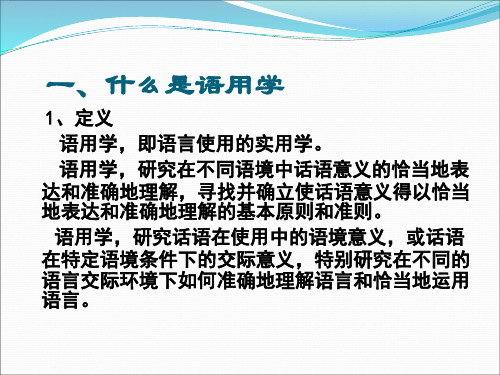
“球鞋”与“波鞋”原来有这么大的不同!一个鞋的质
量等级被名称、符号的等级所取代。这时我才明白, 同一类东西,有的要用中文名叫之,有的却必须用英 文名称之,是因为其价格等级不同。二者的差别之大, 足以在流行观念里成为两种东西。或者说,同一类东 西,只要能够被冠以英文名,其身价就不同了。这就 是流行文化的力量。
4、海姆斯的语境理论 美国社会语言学家海姆斯于1968年把语境归 纳为八个部分:“话语的形式和内容、背景、参 与者、目的、音调、媒介、风格和相互作用的规 范 ”。 ( Cohesion in English,1976 :22) 海姆斯指出:人们进行社会交际时,要有在 一定的时间、地点、场合说出相应恰当话语的能 力,即“交际能力”。这交际能力是由于人和社 会环境相互作用而形成的。人们说话既要符合语 言规则,又要适应言语环境。
2、几个重要概念
在对语用现象进行专题讨论之前,我们需要区分几个 基本概念: 1)句子与话语 句子:是一个句法学、语义学的概念,是脱离语境条 件的抽象的单位,多用于指抽象的语法结构或脱离语境 条件的结构组合,也就是说,它是按照一定的语法规则 组合起来的、具有意义的语言单位,其意义就是词汇意 义和语法意义的组合,在任何条件下它的意义都是恒定 的。
生成 解释 酒喝完了,再去买一瓶 歧义
二、语用学的由来和发展
语用学是一门新兴学科。其得名 于美国逻辑学家莫里斯1937年自造 的英语“pragmatics”(汉译“语 用学”)
电话会话的开端规律:先说话的总是接电话的一 方。这是一个由召唤(拨电话:发出电话铃声)和应 答组成的相邻对。是由人类会话结构规律决定的。
语用学就是研究话语在 使用中的语境意义,或 话语在特定语境条件下 的交际意义,包括意义 的产生与理解,也包括 交际中语言形式或策略 的恰当选择与使用。
Chapter 8 Pragmatics 语用学 语言学教程 胡壮麟.ppt
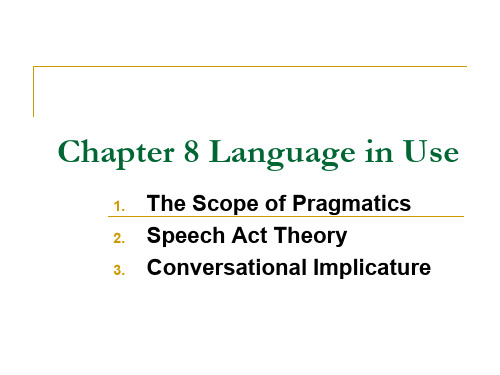
(c) The room was wanted for a meeting.
பைடு நூலகம்
(2) I can’t work under untidy circumstances.
are acts.
8.1.1 Performatives and constatives Austin (How to Do Things with Words,
1962) Consider these sentences: a) I name this ship Elizabeth. b) I bequeath my watch to my brother. c) I now pronounce you man and wife. d) I bet you sixpence it will rain
A. (i) There must be a relevant conventional procedure, and
(ii) the relevant participants and circumstances must be appropriate.
B. The procedure must be executed (i) correctly and (ii) completely.
Possible contexts:
(a) A request to someone to tidy up the circumstances.
(b) It was an excuse for not wanting to do something there.
胡壮麟语言学教程笔记、重点
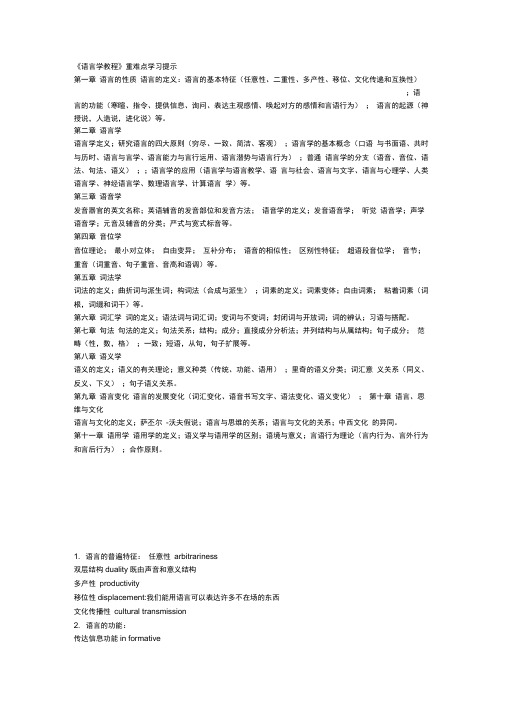
《语言学教程》重难点学习提示第一章语言的性质语言的定义:语言的基本特征(任意性、二重性、多产性、移位、文化传递和互换性);语言的功能(寒暄、指令、提供信息、询问、表达主观感情、唤起对方的感情和言语行为);语言的起源(神授说,人造说,进化说)等。
第二章语言学语言学定义;研究语言的四大原则(穷尽、一致、简洁、客观);语言学的基本概念(口语与书面语、共时与历时、语言与言学、语言能力与言行运用、语言潜势与语言行为);普通语言学的分支(语音、音位、语法、句法、语义);;语言学的应用(语言学与语言教学、语言与社会、语言与文字、语言与心理学、人类语言学、神经语言学、数理语言学、计算语言学)等。
第三章语音学发音器官的英文名称;英语辅音的发音部位和发音方法;语音学的定义;发音语音学;听觉语音学;声学语音学;元音及辅音的分类;严式与宽式标音等。
第四章音位学音位理论;最小对立体;自由变异;互补分布;语音的相似性;区别性特征;超语段音位学;音节;重音(词重音、句子重音、音高和语调)等。
第五章词法学词法的定义;曲折词与派生词;构词法(合成与派生);词素的定义;词素变体;自由词素;粘着词素(词根,词缀和词干)等。
第六章词汇学词的定义;语法词与词汇词;变词与不变词;封闭词与开放词;词的辨认;习语与搭配。
第七章句法句法的定义;句法关系;结构;成分;直接成分分析法;并列结构与从属结构;句子成分;范畴(性,数,格);一致;短语,从句,句子扩展等。
第八章语义学语义的定义;语义的有关理论;意义种类(传统、功能、语用);里奇的语义分类;词汇意义关系(同义、反义、下义);句子语义关系。
第九章语言变化语言的发展变化(词汇变化、语音书写文字、语法变化、语义变化);第十章语言、思维与文化语言与文化的定义;萨丕尔-沃夫假说;语言与思维的关系;语言与文化的关系;中西文化的异同。
第十一章语用学语用学的定义;语义学与语用学的区别;语境与意义;言语行为理论(言内行为、言外行为和言后行为);合作原则。
胡壮麟《语言学教程》笔记第8-9章

Chapter 8 Language in Use1. 语义学与语用学的区别1.1 语用学(Pragmatics)Pragmatics is the study of the use of language in communication, particularly the relationships between sentences and the contexts and situations in which they are used.(语用学是研究语言实际运用的学科,集中研究说话人意义、话语意义或语境意义。
)1.2 区别Pragmatics is sometimes contrasted with semantics, which deals with meaning without reference to the users and communicative functions of sentences.(语用学主要研究在特定的语境中说话人所想要表达的意义,语义学研究的句子的字面意义,通常不考虑语境。
)2. 合作原则及其准则(Herbert Paul Grice)2.1. 合作原则(Cooperative Principle)说话人经常在话语中传达着比话语表层更多的信息,听话人也能够明白说话人所要表达的意思。
格莱斯认为一定存在一些管理这些话语产生和理解的机制。
他把这种机制称作合作原则。
2.2. 准则(maxims)数量准则(quantity)①使你的话语如(交谈的当前目的)所要求的那样信息充分。
②不要使你的话语比要求的信息更充分。
质量准则(quality)设法使你的话语真实①不要讲明知是虚假的话②不要说没证据的话关系准则(relation)所谈内容要密切相关方式准则(manner)要清晰。
①避免含糊不清②避免歧义③要简练(避免冗长)④要有序3. 言语行为理论(Speech Act Theory)---John Austin3.1. 施为句&叙事句(Performatives & Constatives)施为句是用来做事的,既不陈述事实,也不描述情况,且不能验证真假;叙事句要么用于陈述,要么用于验证,可以验证真假。
《语用学》知识

《语用学》知识语用学是语言学各分支中一个以语言意义为研究对象的新兴学科领域,在众多的语用学定义中,有两个概念是十分基本的,一个是意义,另一个是语境,是专门研究语言的理解和使用的学问,它研究在特定情景中的特定话语,研究如何通过语境来理解和使用。
语用学:以语言意义为研究对象的学科领域。
语言学、哲学和心理学的一个分支学科,研究脉络如何影响人运用和理解语言。
语用学分析研究影响语言行为(如招呼、回答、应酬、劝说)的标准和支配轮流发言的规则。
语用学还研究语言用于成事的方式。
例如,「我允诺」用于特定语境中就是允诺。
符号学的一个分支,研究符号或语言词句与其使用之间的关系。
语用学是语言学各分支中一个以语言意义为研究对象的新兴学科领域,是专门研究语言的理解和使用的学问,它研究在特定情景中的特定话语,研究如何通过语境来理解和使用语言。
语用学因其本身的目的性和价值性而不同于语法研究,它是关于人类语言本身的研究。
在语言的使用中,说话人往往并不是单纯地要表达语言成分和符号单位的静态意义,听话人通常要通过一系列心理推断,去理解说话人的实际意图。
要做到真正理解和恰当使用一门语言,仅仅懂得构成这门语言的发音、词汇和语法是远远不够的。
语用学的另一核心概念就是意义。
何兆熊先生(1987)在他的语用学概要一书中指出:“在众多的语用学定义中,有两个概念是十分基本的,一个是意义,另一个是语境。
”从发展的观点看,语用学的崛起是语义研究的发展和延伸的结果,因此可以说语用学是一种对意义的研究。
但语用学所研究的意义不同于形式语义学所研究的意义,它所研究的是语言在一定的语境中使用时体现出来的具体意义。
由此可知,语境对意义的作用在语用学研究中十分重要。
研究在一定的上下文里语言的使用,包括所产生的字面意义和蕴涵意义,以及可能产生的效果的学科。
语用学的概念首先是美国哲学家C.W.莫里斯(1901~1979)和R.卡纳普(1891~1970)在20世纪30年代前后提出的。
胡壮麟《语言学教程》笔记和考研真题及典型题详解(语言的使用)【圣才出品】
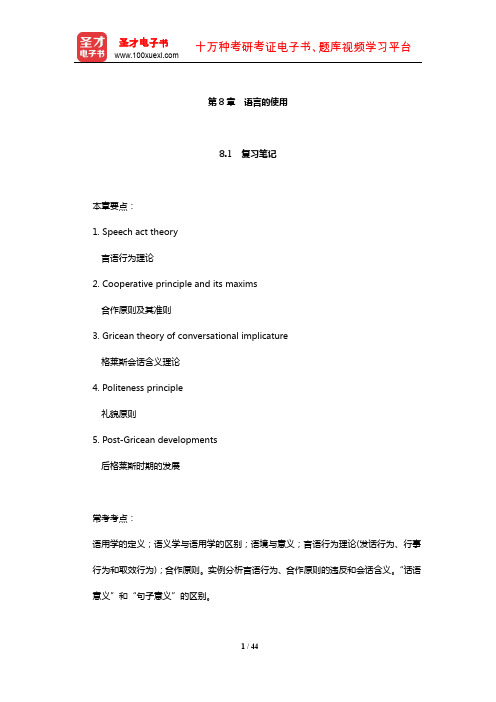
第8章语言的使用8.1 复习笔记本章要点:1. Speech act theory言语行为理论2. Cooperative principle and its maxims合作原则及其准则3. Gricean theory of conversational implicature格莱斯会话含义理论4. Politeness principle礼貌原则5. Post-Gricean developments后格莱斯时期的发展常考考点:语用学的定义;语义学与语用学的区别;语境与意义;言语行为理论(发话行为、行事行为和取效行为);合作原则。
实例分析言语行为、合作原则的违反和会话含义。
“话语意义”和“句子意义”的区别。
本章内容索引:I. Pragmatics1. Definition2. Difference between pragmatics and semantics II. Speech Act Theory1. Performatives and Constatives(1) Definition(2) Felicity Conditions2. A Theory of the Illocutionary Act3. Searle’s Classification of Speech Acts(1) Representatives:(2) Directives(3) Commsives(4) Expressives(5) DeclarationsIII. Cooperative Principle (CP)1. Cooperative Principle and Its Maxims2. Violation of the MaximsIV. Conversational Implicature1. Definition2. Characteristics of Conversational Implicature(1) Calculability.(2) Cancellability(3) Non-detachability(4) Non-conventionality.V. Politeness Principle (PP)VI. Post-Gricean Developments1. Relevance Theory2. The Q- and R-principles3. Levinson’s Q-, I-and M-principles▼4. A socio-cognitive approachI. Pragmatics (语用学)【考点:Pragmatics与Semantics的异同】1. Definition (定义)Pragmatics is the study of language in use, focusing on the study of speaker’s meaning, utterance meaning or contextual meaning.语用学是研究语言实际运用的学科,集中研究说话人意义、话语意义或语境意义。
(完整word版)胡壮麟语言学教程笔记、重点
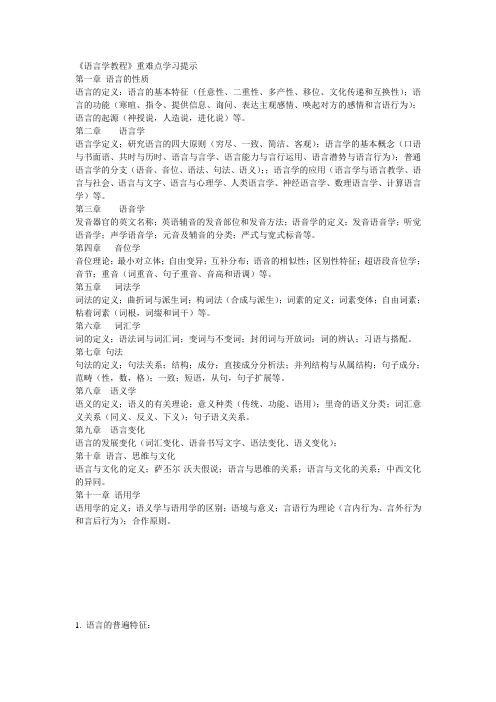
《语言学教程》重难点学习提示第一章语言的性质语言的定义:语言的基本特征(任意性、二重性、多产性、移位、文化传递和互换性);语言的功能(寒暄、指令、提供信息、询问、表达主观感情、唤起对方的感情和言语行为);语言的起源(神授说,人造说,进化说)等。
第二章语言学语言学定义;研究语言的四大原则(穷尽、一致、简洁、客观);语言学的基本概念(口语与书面语、共时与历时、语言与言学、语言能力与言行运用、语言潜势与语言行为);普通语言学的分支(语音、音位、语法、句法、语义);;语言学的应用(语言学与语言教学、语言与社会、语言与文字、语言与心理学、人类语言学、神经语言学、数理语言学、计算语言学)等。
第三章语音学发音器官的英文名称;英语辅音的发音部位和发音方法;语音学的定义;发音语音学;听觉语音学;声学语音学;元音及辅音的分类;严式与宽式标音等。
第四章音位学音位理论;最小对立体;自由变异;互补分布;语音的相似性;区别性特征;超语段音位学;音节;重音(词重音、句子重音、音高和语调)等。
第五章词法学词法的定义;曲折词与派生词;构词法(合成与派生);词素的定义;词素变体;自由词素;粘着词素(词根,词缀和词干)等。
第六章词汇学词的定义;语法词与词汇词;变词与不变词;封闭词与开放词;词的辨认;习语与搭配。
第七章句法句法的定义;句法关系;结构;成分;直接成分分析法;并列结构与从属结构;句子成分;范畴(性,数,格);一致;短语,从句,句子扩展等。
第八章语义学语义的定义;语义的有关理论;意义种类(传统、功能、语用);里奇的语义分类;词汇意义关系(同义、反义、下义);句子语义关系。
第九章语言变化语言的发展变化(词汇变化、语音书写文字、语法变化、语义变化);第十章语言、思维与文化语言与文化的定义;萨丕尔-沃夫假说;语言与思维的关系;语言与文化的关系;中西文化的异同。
第十一章语用学语用学的定义;语义学与语用学的区别;语境与意义;言语行为理论(言内行为、言外行为和言后行为);合作原则。
《语言学教程》第 8 章 语用学
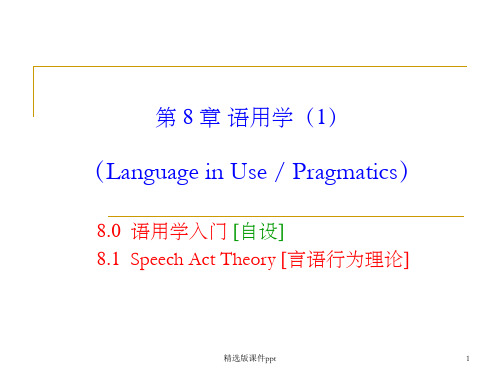
精选版课件ppt
7
①But gradually linguists found that it would be
impossible to give an adequate description of meaning
if the context of language use was left unconsidered.
pragmatic study of language. ②It is generally
considered as constituted by the knowledge shared by
the speaker and the hearer. ③Various components of
shared knowledge have been identified, e.g. knowledge
study. ③Pragmatics is a comparatively a new branch
of study in the area of linguistics; its development and
establishment in the 1960s and 1970s resulted from the
being carried out in the area of pragmatics.
精选版课件ppt
8
“句子”与“语句”
①某年某月某日某时,张三说“天在下雨”;
这是语句( utterance)。②某年某月某日某时,李四
也说“天在下雨”;这也是语句( utterance) 。③张
三、李四各自的语句所表现出的共有的、得到普
certain purpose, then we are treating it as an utterance.
语言学教程[第八章语言的使用]山东大学期末考试知识点复习
![语言学教程[第八章语言的使用]山东大学期末考试知识点复习](https://img.taocdn.com/s3/m/8e175b30580216fc700afda4.png)
第八章语言的使用复习笔记I.语用学1.定义语用学是研究语言实际运用的学科,集中研究说话人意义、话语意义或语境意义。
2.语用学和语义学的区别虽然语用学和语义学都是研究语言意义的学科,但是它们有着很大的差别:语用学主要研究在特定的语境中说话人所想要表达的意义,而语义学研究的是句子的字面意义,通常不考虑语境。
II.言语行为理论言语行为理论是牛津大学哲学家约翰·奥斯丁在他《如何以言行事》一文中提出的。
它从哲学意义上对语言交际的本质进行解释,其目的在于回答“用语言干什么”这个问题。
1.施为句和叙事句奥斯汀提出自己理论的第一步是把句子分成两类:施为句和叙事句。
它们不能应用于传统的真值判断方法。
因此,他对施为句和叙事句作了区分。
(1)定义施为句是用来做事的,既不陈述事实,也不描述情况,且不能验证其真假;叙事句要么用于陈述,要么用于验证,可以验证其真假。
(2)合适条件虽然施为句没有真假,但必须满足一定条件才是合适的。
我们把奥斯汀的合适条件简化如下:①必须有一个相应的规约程序,并且相关的参与者与环境是合适的。
②该程序必须正确全面地得到执行。
③有关人必须有相关的思想、感情和意图,而且必须有相关的后续行为。
但是奥斯汀很快就认识到,这些条件只适用于部分情况。
2.行事行为理论后来,奥斯汀放弃了他最初对叙事句和施为句所做的区分。
他建立了另一种模式来解释如何通过语言实施行为。
根据这种新的模式,说话人说话时可以完成三种行为:发话行为,行事行为和取效行为。
发话行为是说出词、短语、分句的行为,是通过句法、词汇和音位手段表达字面意义的行为。
行事行为是表达说话人意图的行为,是在说话过程中所完成的行为。
取效行为是通过说话完成或通过说话所产生的行为,是由话语所带来的结果和变化。
在上述三种言语行为中,语言学家最感兴趣的是行事行为,因为这种言语行为与说话人的意图一致。
在研究语言交际时,语言学家最感兴趣的是说话人如何表达他的意图和听话人如何识别说话人的意图。
Chapter 8 Pragmatics 语用学 语言学教程 胡壮麟
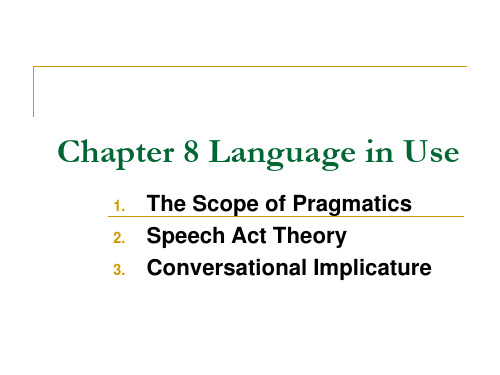
The utterance of these sentences is the doing of an action. They cannot be said to be true or false. So these sentences are called performatives. A constative sentence is a description of what the speaker is doing at the time of speaking. It can be said to be true or false. For example, I pour some liquid into the tube. Implicit performatives – It‟s cold here. Explicit performatives – Please close the door.
Please come in.
(1) The room is messy. Possible context: (a) A mild criticism of someone who should have cleaned the room. (b) In a language class where a student made a mistake, for he intended to say “tidy”. (c) The room was wanted for a meeting.
Байду номын сангаас
Felicity conditions – how to make sth. valid Austin:Although performatives cannot be true or false, there are still conditions for them to meet to be appropriate or felicitous.
语言学教程 第三版 第八章 语用学
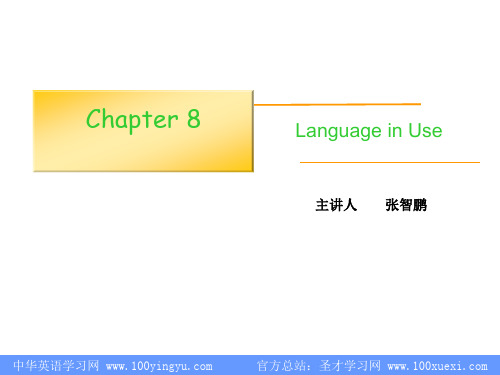
官方总站:圣才学习网
8.1.2 A Theory of the Illocutionary Act
Speech acts can be analyzed on 3 levels: ■A locutionary act(发话行为/言内行为): the act of saying something in the full sense of “say”. ■An illocutionary act(行事行为/言外行为): an act performed in saying something. To say sth is to do sth.
■Conclusion: ■The distinction between constatives & performatives cannot be maintained. ■All sentences can be used to do things.
中华英语学习网
■In saying X, I was doing Y. ■In saying “I will come tomorrow”, I was making a promise. ■Illocutionary force: equivalent to speaker's meaning, contextual meaning, or extra meaning, and may be
■John Austin (1911-1960) ■How to Do Things with Words (1962) ■speech acts: actions performed via utterances
8.1.1 Performatives vs. Constatives(施为句与叙事句) ■Constatives: utterances which roughly serves to state a fact, report that something is the case, or describe
简明英语语言学教程1-8章知识要点
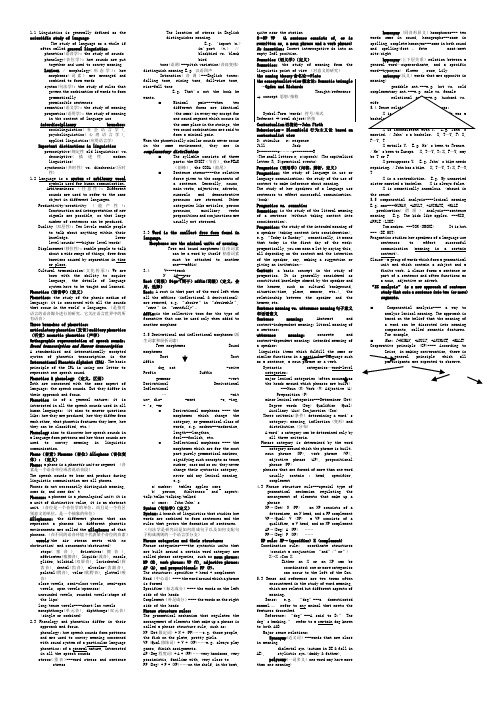
1.1 Linguistics is generally defined as the scientific study of language . The study of language as a whole if often called general linguistics . phonetics(语音学): the study of sounds phonology(音位学): how sounds are put together and used to convey meaning Lexicon / morphology(形态学): how morphemes(词素) are arranged and combined to form words syntax(句法学): the study of rules that govern the combination of words to form grammatically permissible sentences semantics(语义学): the study of meaning pragmatics(语用学): the study of meaning in the context of language use interdisciplinary branches: sociolinguistics(社会语言学), psycholinguistics(心理语言学), applied linguistics(应用语言学) Important distinctions in linguistics prescriptive(规定性 old linguistics) vs. descriptive(描述性 modern linguistics) synchronic(共时性) vs. diachronic(历时性) 1.2 Language is a system of arbitrary vocal symbols used for human communication. Arbitrariness (任意性): Different sounds are used to refer to the same object in different languages. Productivity/creativity (能产性): Construction and interpretation of new signals are possible, so that large number of sentences can be produced. Duality (双层性): Two levels enable people to talk about anything within their knowledge. lower level(sounds)---higher level(words) Displacement(移位性): enable people to talk about a wide range of things, free from barriers caused by separation in time or place. Cultural transmission(文化传承): We are born with the ability to acquire language, the details of language system have to be taught and learned. Phonetics (语音学)(定义) Phonetics: the study of the phonic medium of language: it is concerned with all the sounds that occur in the world’s languages.(是指对语言的语音媒介进行的研究,它关注语言世界中的所有语音) Three branches of phonetics: articulatory phonetics (发音)auditory phonetics (听觉)acoustic phonetics (声学) Orthographic representation of speech sounds :Broad transcription and Narrow transcription A standardized and internationally accepted system of phonetic transcription is the International Phonetic Alphabet (IPA). The basic principle of the IPA is using one letter to represent one speech sound. Phonetics & phonology :(定义,区别) Both are concerned with the same aspect of language: the speech sounds. But they differ in their approach and focus. Phonetics is of a general nature; it is interested in all the speech sounds used in all human languages; (it aims to answer questions like: how they are produced, how they differ from each other, what phonetic features they have, how they can be classified, etc.) Phonology aims to discover how speech sounds in a language form patterns and how these sounds are used to convey meaning in linguistic communication. Phone (音素)Phoneme (音位)Allophone (音位变体): (定义) Phone: a phone is a phonetic unit or segment (音素是一个语音单位或者说语音段) The speech sounds we hear and produce during linguistic communication are all phones. Phones do not necessarily distinguish meaning, some do, and some don’t Phoneme: a phoneme is a phonological unit ; it is a unit of distinctive value, it is an abstract unit.(音位是一个音位学的单位,而且是一个有区别意义的单位,是一个抽象的单位) Allophones: the different phones that can represent a phoneme in different phonetic environments are called the allophones of that phoneme.(在不同的语音环境下代表某个音位的音素) vowels (the air stream meets with no obstruction) and consonants(obstructed) stops(塞音), fricatives(擦音), affricates(塞擦音), liquids(流音), nasals, glides, bilabial(双唇音), laviodental(唇齿音), dental(齿音), alveolar(齿龈音), palatal(腭音), velar(软腭音), glottal(喉音) close vowels, semi-close vowels, semi-open vowels, open vowels(openness) unrounded vowels, rounded vowels(shape of the lips) long/tense vowels----short/lax vowels monophthongs(单元音), diphthongs(双元音) (single or combined)2.3 Phonology and phonetics differ in their approach and focus. phonology: how speech sounds form patterns and are used to convey meaning concerned with sound system of a particular language phonetics: of a general nature, interested in all the speech sounds stress(重音)---word stress and sentence stress The location of stress in English distinguishes meaning. E.g. ‘import (n.) im’port (v.) // blackbird vs. black bird tone(语调)---pitch variation(音高变体) distinguish meaning E.g. 汉语四声 Intonation(音调)---English tones: falling tone, rising tone, fall-rise tone, rise-fall tone E.g. That’s not the book he wants. ⏹ Minimal pair----when two different forms are identical (the same) in every way except for one sound segment which occurs in the same place in the strings, the two sound combinations are said to form a minimal pair. When the phonetically similar sounds never occur in the same environment, they are in complementary distribution . ⏹ The syllable consists of three parts: the ONSET (节首), the PEAK (韵峰), the CODA (韵尾) ⏹ Sentence stress----the relative force given to the components of a sentence. Generally, nouns, main verbs, adjectives, adverbs, numerals and demonstrative pronouns are stressed. Other categories like articles, person pronouns, auxiliary verbs prepositions and conjunctions are usually not stressed.3.3 Word is the smallest free form found in language. Morphemes are the minimal units of meaning. Free and bound morphemes(自由词素can be a word by itself 粘着词素must be attached to another one---affix) 3.4 V----teachN Af----er Root (词根)Stem (词干)affix(词缀)(定义,会用,选择)Root: A root is that part of the word left when all the affixes (inflectional & derivational) are removed, e.g. “desire” in “desirable”, “care” in “ca refully ”. Affix:is the collective term for the type of formative that can be used only when added to another morpheme 3.5 Derivational and inflectional morphemes(派生词素和屈折词素) Free morphemes Bound morphemes Root Root Affix dog, cat -ceive Prefix Suffix grammar -vert Derivational Derivational Inflectional … -mit un-, dis- -ment -s, -ing, -‘s, -er ● Derivational morphemes ---- the morphemes which change the category, or grammatical class of words, e.g. modern---modernize, length---lengthen, fool---foolish, etc. ● Inflectional morphemes ---- the morphemes which are for the most part purely grammatical markers, signifying such concepts as tense, number, case and so on; they never change their syntactic category, never add any lexical meaning, e.g. a) number: tables apples cars b) person, finiteness and aspect: talk/talks/talking/talked c) case: John/John’s Syntax (句法学)(定义) Syntax: A branch of linguistics that studies how words are combined to form sentences and the rules that govern the formation of sentences. (句法学是研究词是如何组成句子以及如何支配句子构成规则的一个语言学分支) Phrase categories and their structures Phrase categories----the syntactic units that are built around a certain word category are called phrase categories, such as noun phrase: NP (N), verb phrase: VP (V), adjective phrase: AP (A), and prepositional: PP (P). The structure: specifier + head + complement Head (中心语)---- the word around which a phrase is formed Specifier (标志成分)---- the words on the left side of the heads Complement (补足成分)---- the words on the right side of the heads Phrase structure rules: The grammatical mechanism that regulates the arrangement of elements that make up a phrase is called a phrase structure rule, such as: NP (Det 限定词) + N + (PP)……e.g. those people, the fish on the plate, pretty girls. VP (Qual 修饰词) + V + (NP)……e.g. always play games, finish assignments. AP (Deg 程度词) + A + (PP)……very handsome, very pessimistic, familiar with, very close to PP (Deg) + P + (NP)……on the shelf, in the boat, quite near the station S→NP VP (A sentence consists of, or is rewritten as, a noun phrase and a verb phrase)Do insertion: Insert interrogative do into an empty Infl position. Semantics (语义学)(定义)Semantics: the study of meaning from thelinguistic point of view (对意义的研究)Behaviorism→ Bloomfield 行为主义论 based on contextualist view S: stimulus r: responseJill Jack S---------r………s ---------R(The small letters r, sàspeech) (The capitalized letter R, Sàpractical events)Pragmatics (语用学)(问答,辨析,定义)Pragmatics: the study of language in use orlanguage communication; the study of the use ofcontext to make inference about meaning.The study of how speakers of a language usesentences to effect successful communication. (book)Pragmatics vs. semanticsSemantics: is the study of the literal meaning of a sentence (without taking context into consideration).Pragmatics: the study of the intended meaning ofa speaker (taking context into consideration), e.g. “Today is Sunday”, semantically, it means that today is the first day of the week;pragmatically, you can mean a lot by saying this,all depending on the context and the intention of the speaker, say, making a suggestion or giving an invitation…Context: a basic concept in the study ofpragmatics. It is generally considered as constituted knowledge shared by the speaker and the hearer, such as cultural background,situation(time, place, manner, etc.), the relationship between the speaker and the hearer,etc. Sentence meaning vs. utterance meaning 句子意义和话语意义 Sentence meaning: Abstract and context-independent meaning; literal meaning of a sentence; utterance meaning: concrete and context-dependent meaning; intended meaning of a speaker; linguistic items which fulfill the same or similar functions in a particular language such as a sentence, a noun phrase or a verb. Syntactic categories —word-level categories: major lexical categories (often assumed as the heads around which phrases are built) ---Noun (N) Verb (V) Adjective (A) Preposition (P) minor lexical categories---Determiner (Det) Degree words (Deg) Qualifier (Qual) Auxiliary (Aux) Conjunction (Con) Three criteria(条件) determining a word’s category: meaning, inflection (变形) and distribution (分布) A word’s category can be determined only by all three criteria. Phrase category is determined by the word category around which the phrase is built. noun phrase (NP), verb phrase (VP), adjective phrase (AP), prepositional phrase (PP) phrases that are formed of more than one word usually contain : head, specifier, complement 4.3 Phrase structure rule---special type of grammatical mechanism regulating the arrangement of elements that make up a phrase NP→(Det) N (PP) an NP consists of a determiner, an N head, and a PP complement VP→(Qual) V (NP) a VP consists of a qualifier, a V head, and an NP complement AP→(Deg) A (PP) …… PP→(Deg) P (NP) …… XP rule: XP→(specifier) X (complement) Coordination rule: coordinate structures (consist a conjunction “and”/”or”)X→X *Con X Either an X or an XP can be coordinated; one or more categories can occur to the left of the Con. 5.3 Sense and reference are two terms often encountered in the study of word meaning,which are related but different aspects of meaning.Sense: e.g. “dog”---a domesticated mammal... refer to any animal that meets the features describedReference: “dog”---A said to B:” The dog’s barking.” refer to a certain dog knownto both A&B Major sense relations:Synonymy (近义词)---words that are close in meaning dialectal syn.(autumn in BE & fall inAE), stylistic syn.(daddy & father), polysemy (一词多义)one word may have morethan one meaning)homonymy (同音形异义)homophones--- twowords same in sound, homographs---same in spelling, complete homonyms---same in both sound and spelling)feet 、fete meat/meet site/sighthyponymy (上下层关系)relation between a general word —superordinate, and a specific word--hyponyms) flower , rose, Lilyantonymy (反义)words that are opposite in meaning)gradable ant.---e.g. hot vs. cold complementary ant.---e.g. male vs. femalemarried. / John’s a bachelor. X, T—Y, F; X, F —Y, TX entails Y. E.g. He’s been to France. / He’s been to Europe. X, T—Y, T; X, F —Y, may be T or FX presupposes Y. E.g. John’s bike needs repairing. / John has a bike. X, T —Y, T; X, F —Y, TX is a contradiction. E.g. My unmarried sister married a bachelor. X is always false. X is semantically anomalous. (absurd in the sense)5.5 componential analysis----lexical meaning E.g. man---+HUMAN, +ADULT, +ANIMATE, +MALE predication(谓项) analysis---sentence meaning E.g. The kids like apples. ---KID, APPLE (LIKE) Tom smokes. ---TOM (SMOKE) It is hot. --- (BE HOT) Pragmatics studies how speakers of a language usesentences to effect successful communication (meaning in a certain context). Clause —a group of words which form a grammaticalunit and which contain a subject and a finite verb. A clause forms a sentence or part of a sentence and often functions as a noun, adjective or adverb.“IC analysis” is a new approach of sentencestudy that cuts a sentence into two (or more) segments. ⏹ Componential analysis---- a way toanalyze lexical meaning. The approach is based on the belief that the meaning of a word can be dissected into meaning components, called semantic features. For example,⏹ Man: [+HUMAN, +ADULT, +ANIMATE, +MALE] Cooperative principle (CP)---- According toGrice, in making conversation, there is a general principle which all participants are expected to observe.。
英语语言学教程语言的使用与行为理论
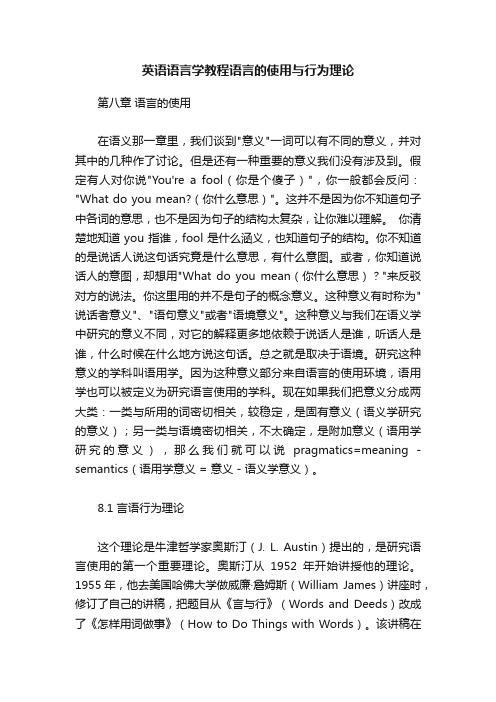
英语语言学教程语言的使用与行为理论第八章语言的使用在语义那一章里,我们谈到"意义"一词可以有不同的意义,并对其中的几种作了讨论。
但是还有一种重要的意义我们没有涉及到。
假定有人对你说"You're a fool(你是个傻子)",你一般都会反问:"What do you mean?(你什么意思)"。
这并不是因为你不知道句子中各词的意思,也不是因为句子的结构太复杂,让你难以理解。
你清楚地知道you指谁,fool是什么涵义,也知道句子的结构。
你不知道的是说话人说这句话究竟是什么意思,有什么意图。
或者,你知道说话人的意图,却想用"What do you mean(你什么意思)?"来反驳对方的说法。
你这里用的并不是句子的概念意义。
这种意义有时称为"说话者意义"、"语句意义"或者"语境意义"。
这种意义与我们在语义学中研究的意义不同,对它的解释更多地依赖于说话人是谁,听话人是谁,什么时候在什么地方说这句话。
总之就是取决于语境。
研究这种意义的学科叫语用学。
因为这种意义部分来自语言的使用环境,语用学也可以被定义为研究语言使用的学科。
现在如果我们把意义分成两大类:一类与所用的词密切相关,较稳定,是固有意义(语义学研究的意义);另一类与语境密切相关,不太确定,是附加意义(语用学研究的意义),那么我们就可以说pragmatics=meaning - semantics(语用学意义 = 意义 - 语义学意义)。
8.1 言语行为理论这个理论是牛津哲学家奥斯汀(J. L. Austin)提出的,是研究语言使用的第一个重要理论。
奥斯汀从1952年开始讲授他的理论。
1955年,他去美国哈佛大学做威廉·詹姆斯(William James)讲座时,修订了自己的讲稿,把题目从《言与行》(Words and Deeds)改成了《怎样用词做事》(How to Do Things with Words)。
- 1、下载文档前请自行甄别文档内容的完整性,平台不提供额外的编辑、内容补充、找答案等附加服务。
- 2、"仅部分预览"的文档,不可在线预览部分如存在完整性等问题,可反馈申请退款(可完整预览的文档不适用该条件!)。
- 3、如文档侵犯您的权益,请联系客服反馈,我们会尽快为您处理(人工客服工作时间:9:00-18:30)。
①But gradually linguists found that it would be impossible to give an adequate description of meaning if the context of language use was left unconsidered. ② But once the notion of context was taken into consideration, semantics spilled over into pragmatics. ③What essentially distinguishes semantics and pragmatics is whether in the study of meaning the context of language use is considered. ④If it is not considered, the study is confined to the area of traditional semantics; if it is considered, the study is being carried out in the area of pragmatics.
Sentence meaning and utterance meaning
[句子意义与语句意义]
ቤተ መጻሕፍቲ ባይዱ
①A sentence is a grammatical concept, and the meaning of a sentence is often the abstract, intrinsic property of the sentence itself in terms of predication. ②But if we think of a sentence as what people actually say in the course of communication, it becomes an utterance, and it should be considered in the situation in which it is actually uttered or used. ③So it is possible to tell if ―The dog is barking‖ is a sentence or an utterance. ④It can be either. ⑤It all depends on how we look at it and how we are going to analyze it.
8.1 Speech Act Theory 言语行为理论
言语行为理论的提出者
约翰・奥斯汀 (John Austin) (1911– 1960)
⑥If we take it as a grammatical unit and consider it as a self–contained unit in isolation from context, then we are treating it as a sentence. ⑦If we take it as something a speaker utters in a certain situation with a certain purpose, then we are treating it as an utterance. ⑧Therefore, while the meaning of a sentence is abstract, and decontextualized, that of an utterance is concrete, and context-dependent. ⑨The meaning of an utterance is based on sentence meaning; it is the realization of the abstract meaning of a sentence in a real situation of communication, or simply in a context.
①From then on, this has been the dominant tradition of linguistic study. ②This is the spirit in which traditional phonology studied the sounds of language, traditional syntax studied the structure of sentences, traditional semantics studied meaning. ③ The meaning of language was considered as something intrinsic and inherent, i.e. , a property attached to language itself. ④Therefore, meaning of words, meaning of sentences were all studied in isolation from language use.
第 8 章 语用学(1)
(Language in Use / Pragmatics)
8.0 语用学入门 [自设] 8.1 Speech Act Theory [言语行为理论]
8.0
语用学入门
Definitions of Pragmatics
①Pragmatics is the study of meaning in context. ②It deals with particular utterances in particular situations and is especially concerned with the various ways the social contexts of language performance can influence interpretation. ③In other words, pragmatics is concerned with the ways language is used to communicate rather than the way language is internally structured. (本教材的P18)
Pragmatics vs Semantics
①The publication of Saussure‘s work Course in General Linguistics in the early 20th century marked the beginning of modern linguistics and at the same time laid down the key note for modern linguistics, i.e. language should be studied as a self-contained, intrinsic system; any serious study of language cannot afford to investigate the use of language and extra-linguistic factors were not to be considered. [ 《普通语言学教程》的尾句:The only true object of study in linguistics is the language, considered in itself and for its own sake. ]
―句子”与“语句”
①某年某月某日某时,张三说“天在下雨”; 这是语句( utterance)。②某年某月某日某时,李四 也说“天在下雨”;这也是语句( utterance) 。③张 三、李四各自的语句所表现出的共有的、得到普 遍承认的东西是句子(sentence)。 ①语句是句子在具体语境中的体现或运用。
each other. ④Context determines the speaker‘s use of language and also the hearer‘s interpretation of what is said to him. ⑤Without such knowledge, linguistic communication would not be possible, and without considering such knowledge, linguistic communication cannot be satisfactorily accounted for in a pragmatic sense.
―微观语言学(microlinguistics)‖与“语言”
音位学 子系统 - 1:
微 观 语 言 学
语音
形态学
子系统 - 2:
句法学 语义学
词汇语法
子系统 - 3:
语 言
(Langue)
语义
①Pragmatics is generally defined as the study of how speakers of a language use sentences to effect successful communication. ②As the process of communication is essentially a process of conveying and understanding meaning in a certain context, pragmatics can also be regarded as a kind of meaning study. ③Pragmatics is a comparatively a new branch of study in the area of linguistics; its development and establishment in the 1960s and 1970s resulted from the expansion of the study of linguistics, especially that of semantics. [《新编简明英语语言学教程》P84]
